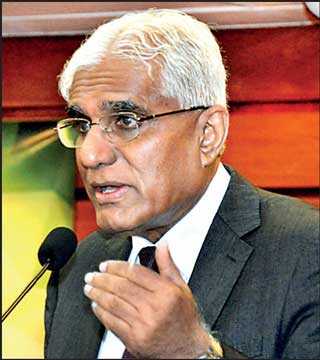Thursday Nov 14, 2024
Thursday Nov 14, 2024
Thursday, 20 June 2019 00:12 - - {{hitsCtrl.values.hits}}
The Central Bank yesterday launched the Roadmap for Sustainable Finance to encourage the financial system to promote financing for climate resilience projects to combat climate change in Sri Lanka.
 |
Central Bank Governor
|
This was the national launch of the Roadmap as it was previously unveiled globally on 10 April at the Sustainable Banking Network Global Meeting of the International Finance Corporation (IFC) in Washington. The Central Bank joined its global counterparts in having a framework to encourage banks, leasing and insurance companies to provide finance for projects that aim to combat climate change or be climate resilient. Sri Lanka has been named as one of the countries that are most vulnerable to the adverse effects of climate change by the World Bank.
“The Central Bank has placed much focus on sustainability. We consider it to be one of the core principles of the financial sector. This is why we have taken the step of introducing a Roadmap. The main thrust of this Roadmap is to ensure that sustainability is embedded in the decisions of the stakeholders in the financial system. We are very cognoscente of the unprecedented climate change and its unintended and dangerous consequences.
The frequency and severity of extreme climate events are increasing. This is borne out by events around the world,” Central Bank Governor Dr. Indrajit Coomaraswamy said.
Guided by the Paris agreement that targets a rise of less than two degrees Celsius, financial systems across countries are facing the challenge of speeding and scaling up the financial facilitation needed for building resilient economies while managing related environmental and social risks.
“The world is facing a daunting investment gap in delivering the Paris agreement. The OECD estimates $ 69 trillion investment in energy, transport, building and water infrastructure will be required in the next two decades to meet the Paris agreement targets. This target is within range and we should aspire to it. Public funding will obviously not be sufficient to fund programs needed to fight climate change; the financial sector and the private sector have a critical role to play in addressing this gap. Hence mobilising investors from the private sector to finance sustainable projects is crucial to achieving tangible results,” he added.
The Governor noted there was evidence strong leadership is required from central banks and supervisors to ensure the financial sector works to fight climate risks. It is within the mandate of central banks to respond to the challenges of climate change.
“A recently published study suggests how climate change may directly impact the traditional core responsibilities of central banks. The implications of this study is central banks will have to incorporate climate change and climate resilience into their core policy implementation frameworks to efficiently and successfully safeguard price and financial system sustainability. We recognise that financial system management requires an appreciation of climate risks. We also agree that proactive recognition and early response are needed to deal with the economic impact of extreme climate events.”
The Roadmap was developed in consultation with stakeholders, including the Sri Lanka Bankers’ Association (Guarantee) Ltd., Finance Houses Association of Sri Lanka, Insurance Regulatory Commission of Sri Lanka, and Securities and Exchange Commission of Sri Lanka. The IFC served as the secretariat and technical advisor, and the United Nations Development Program (UNDP) provided financial support through its Biodiversity Finance Initiative to the Central Bank in designing the Sustainable Finance Roadmap.
This Roadmap provides a broad direction to financial regulators and financial institutions to effectively manage environmental, social and governance (ESG) risks associated with projects they finance, and promotes assistance to businesses that are greener, climate-friendly and socially inclusive. It attempts to scale up the contribution of the financial sector – including banking and finance, capital markets, and the insurance industry – and help build a more resilient, sustainable green economy. The Roadmap articulates a series of strategic activities to implement sustainable finance in Sri Lanka, while detailing an action plan to be implemented over the short, medium and long term by respective stakeholders.
The Central Bank has appointed a Steering Committee on Implementation of the Roadmap for Sustainable Finance in Sri Lanka to facilitate effective implementation of the strategic activities encompassed in the Roadmap.
The committee envisages monitoring and reviewing the progress while incentivising stakeholders in practicing sustainable finance in their ordinary course of business. Having identified the need for capacity development in the sphere of sustainable finance in Sri Lanka, the Central Bank, through its training arm, Centre for Banking Studies (CBS), has designed a series of training programs for stakeholders of sustainable finance. The first of such capacity building initiatives will be held today and tomorrow at CBS, in collaboration with IFC and UNDP.